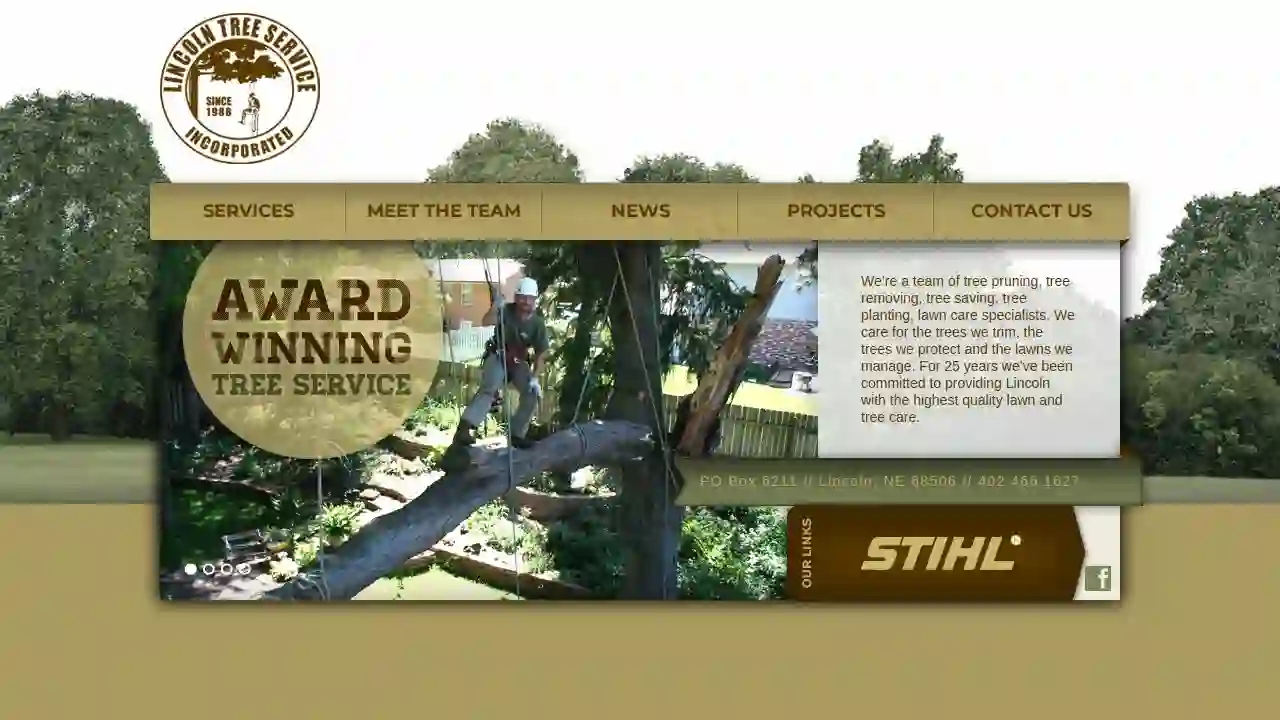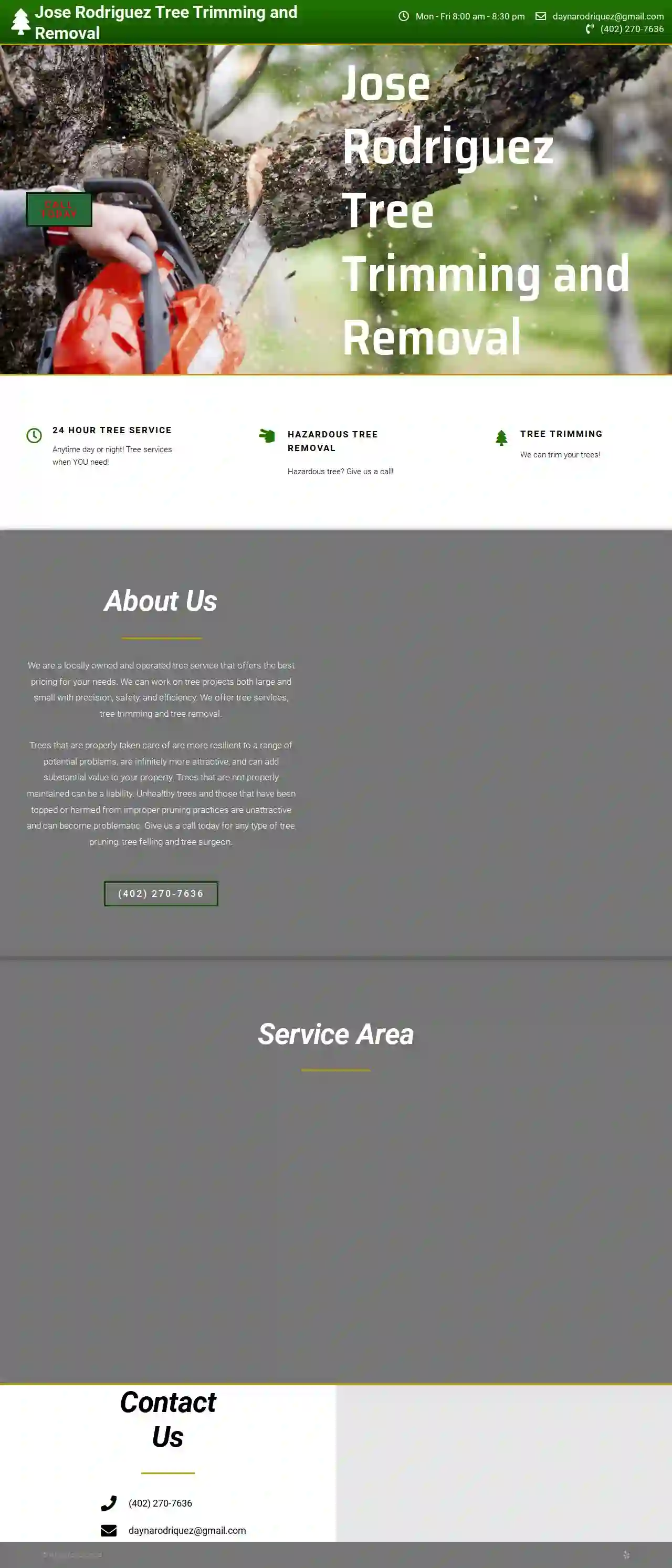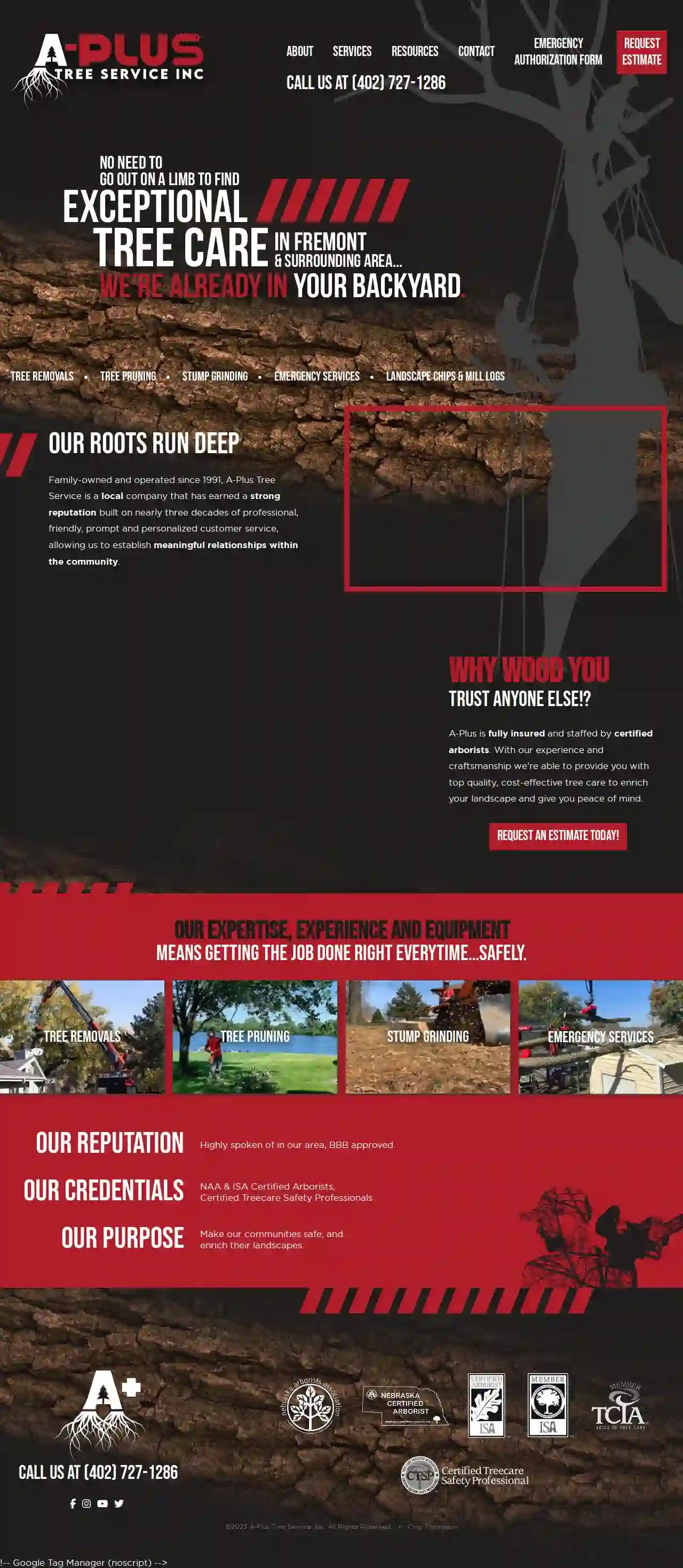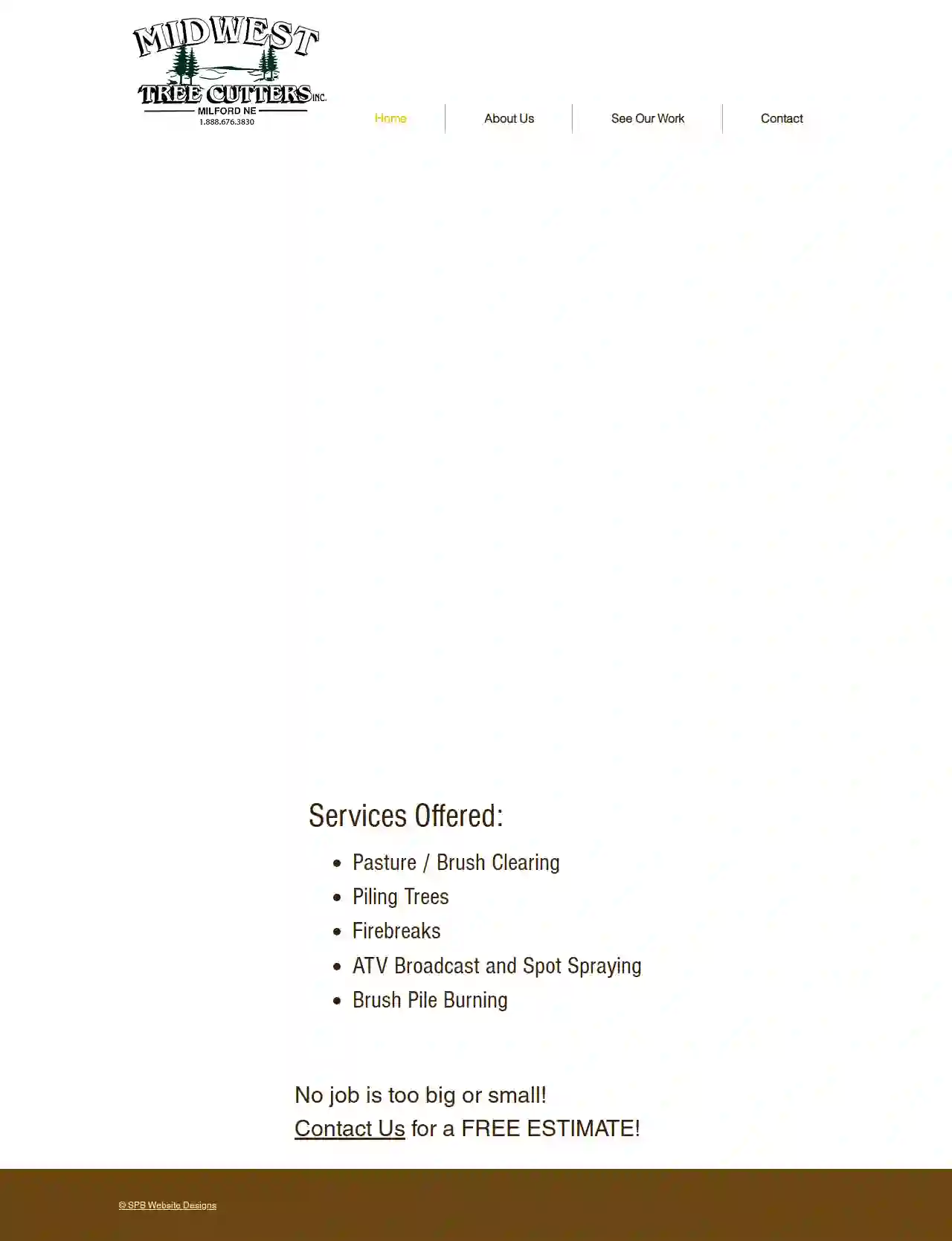Tree Service Papillion
Best Tree Service in Papillion
Receive up to 3 Tree Services quotes for your project today! Compare profiles, reviews, accreditations, portfolio, etc... and choose the best deal.

The Davey Tree Expert Company
4.461 reviewsKent, Ohio, 1500 N Mantua St, 44240, USDavey is a leading provider of tree care, landscaping, and environmental consulting services. With operations throughout North America, the company offers comprehensive solutions for residential, commercial, and utility clients. Their team of experts includes certified arborists, landscape architects, and environmental scientists who are committed to delivering high-quality services and promoting sustainable practices.
- Services
- Why Us?
- Accreditations
- Our Team
- Testimonials
- Gallery
Get Quote
WITT 360 Tree Service
520 reviews190 Agamemnon St, Cordova, 68330, USWelcome to Witt 360 Tree Service, the premier provider of professional tree care services in Cordova, Nebraska. With years of experience and a team of certified arborists, we are committed to ensuring the health, safety, and beauty of your trees and landscapes. Our comprehensive range of services, from tree removal and trimming to emergency tree care and lot clearing, makes us the go-to Cordova tree service for all your arboricultural needs.
- Services
- Why Us?
- Accreditations
- Gallery
Get Quote
Lincoln Tree Service Inc
422 reviewsLincoln, NE, USA, PO Box 6211, 68506, USLincoln Tree Service is a team of tree pruning, tree removing, tree saving, tree planting, lawn care specialists. We care for the trees we trim, the trees we protect and the lawns we manage. For 25 years we’ve been committed to providing Lincoln with the highest quality lawn and tree care.
- Services
- Why Us?
- Accreditations
- Our Team
- Testimonials
- Gallery
Get Quote
Nebraska Tree Services
1234 Elm Street, Lincoln, NE, 68508, USNebraska Tree Services offers professional tree service to the residents of Lincoln, Nebraska. Our team offers tree services, including tree removal, stump removal, and tree pruning. Our team is well-experienced professionals who will take care of your tree needs efficiently and effectively. Our services are affordable and tailor-made to meet your specific needs. We believe in providing quality service at a fair price, which is why we are your go-to choice for all your tree service needs in Lincoln, Nebraska.
- Services
- Why Us?
- Accreditations
- Our Team
- Testimonials
- Gallery
Get Quote
Jose Rodriguez Tree Trimming and Removal
521 reviewsOmaha, USJose Rodriguez Tree Trimming and Removal is a locally owned and operated tree service that offers the best pricing for your needs. We can work on tree projects both large and small with precision, safety, and efficiency. We offer tree services, tree trimming, and tree removal. Trees that are properly taken care of are more resilient to a range of potential problems, are infinitely more attractive, and can add substantial value to your property. Trees that are not properly maintained can be a liability. Unhealthy trees and those that have been topped or harmed from improper pruning practices are unattractive and can become problematic.
- Services
- Why Us?
Get Quote
A-Plus Tree Service Inc
4.9190 reviewsFremont, NE, 68025, USA-Plus Tree Service is a family-owned and operated local business that has been serving the Fremont, NE area for nearly three decades. They are fully insured and staffed by certified arborists, providing top-quality, cost-effective tree care to enrich landscapes and give customers peace of mind. Their services include tree removals, tree pruning, stump grinding, emergency services, and landscape chips & mill logs.
- Services
- Why Us?
- Accreditations
- Our Team
- Testimonials
- Gallery
Get Quote
Midwest Tree Cutters, Inc.
42 reviews123 Main St, Suite 100, Springfield, 12345, USMidwest Tree Cutters is a local business that specializes in various tree cutting and land management services. Their mission is to provide high-quality services to their clients, ensuring satisfaction and safety. They have a team of experienced professionals who are dedicated to their work and strive to deliver the best results.
- Services
- Why Us?
- Accreditations
- Our Team
- Testimonials
- Gallery
Get Quote
Great Plains Tree Care
4.793 reviews18512 Q Street, Omaha, NE, 68135, USGreat Plains Tree Care is a trusted arborist in Omaha, offering residential and commercial tree services. They specialize in tree removal, aesthetic pruning, storm damage repair, stump grinding, and root-zone fertilization. Their team consists of certified arborists with a combined experience of over 20 years, ensuring high-quality service at economical prices.
- Services
- Why Us?
- Accreditations
- Our Team
- Testimonials
- Gallery
Get Quote
Marv’s Tree Service
562 reviews6715 North 92nd Street, Omaha, 68122, USMarv's Tree Service Omaha is a family-owned business that has been providing top-quality tree care to the Omaha community for over 60 years. Our team of licensed and insured arborists specializes in tree trimming, removal, pruning, injections, and stump grinding. We take pride in our personalized, high-value service and are dedicated to enhancing aesthetic, promoting strong growth, and improving tree structure to create a safer environment for your home and family.
- Services
- Why Us?
- Accreditations
- Our Team
- Gallery
Get Quote
American Arborist
4.859 reviews6942 N 97th Circle, Omaha, 68122, USAmerican Arborist is a homegrown, family-owned tree services company based in Omaha, Nebraska. They offer a broad suite of tree services including tree removal, trimming, pruning, treatment, grinding, and general tree care. Their team is dedicated to providing safe, efficient, and professional services to both commercial and residential clients. They prioritize customer satisfaction and safety, ensuring that all work is done correctly and at a fair price.
- Services
- Why Us?
- Accreditations
- Our Team
- Testimonials
- Gallery
Get Quote
Over 16,467+ Tree Service Contractors registered
Our tree care contractors operate in Papillion and surrounding areas!
TreeServiceMatch has curated and vetted Top Arborists in Papillion. Find a reliable business today.
Frequently Asked Questions About Tree Services
- Tree Protection Zone (TPZ): Establish a designated area around the trees that is off-limits to construction activities. The size of the TPZ depends on the tree's size and species, but generally, it should extend to the drip line (the outermost edge of the tree's canopy).
- Root Protection: Avoid digging, trenching, or compacting the soil within the TPZ. If excavation is necessary, use hand digging or air spading to minimize root disturbance.
- Trunk Protection: Protect tree trunks from damage by wrapping them with protective barriers, such as burlap or plywood.
- Branch Protection: Avoid cutting or damaging branches unless absolutely necessary. If pruning is required, have it done by a certified arborist.
- Watering: Ensure trees receive adequate water during construction, especially if the soil has been disturbed or compacted.
- Monitoring: Regularly monitor trees for signs of stress or damage during and after construction.
- Experience and qualifications: 'How long have you been in business? Are your arborists certified? What experience do you have with similar projects?'
- Licensing and insurance: 'Are you licensed and insured? Can you provide proof of insurance?'
- Safety practices: 'What safety measures do you take to protect your workers and my property during the project?'
- Cleanup and disposal: 'What will you do with the tree debris after the job? Will you remove the stump and clean up the work area?'
- References: 'Can you provide references from previous clients?'
- Written estimates: 'Can you provide a detailed written estimate outlining the scope of work, costs, and timeframe?'
- Small roots: Cutting small, superficial roots during landscaping or gardening is usually not a significant problem for the tree.
- Encroaching roots: Roots growing into sidewalks, driveways, or foundations may need to be cut back. However, it's essential to do this carefully to avoid damaging the tree's structural integrity.
- Root pruning for transplanting: Before transplanting a tree, root pruning is done to encourage new root growth within a smaller area, making the transplanting process more successful.
- Tree instability: Cutting large structural roots can weaken the tree's support system, making it more susceptible to windthrow or breakage.
- Disease entry: Cuts create wounds that can serve as entry points for disease-causing organisms.
- Reduced nutrient and water uptake: Cutting roots can limit the tree's ability to absorb water and nutrients from the soil.
- Safety: Felling a tree is extremely dangerous without proper training and equipment. Falling branches or the entire tree can cause serious injury or even death.
- Property Damage: If the tree falls in the wrong direction, it could damage your home, vehicles, or other structures on your property.
- Liability: If you cause damage to your neighbor's property or injure someone while cutting down a tree yourself, you could be held liable.
- Equipment: You'll need to invest in or rent specialized equipment like chainsaws, safety gear, ropes, and potentially a wood chipper.
- Disposal: You'll be responsible for disposing of the tree debris, which can be time-consuming and expensive, especially for large trees.
- Repairs: If the tree falls incorrectly and causes damage, you'll have to cover the cost of repairs.
What is the best way to protect trees during construction?
What questions should I ask a tree service company?
Is it OK to cut tree roots?
**When it's OK to cut roots:**
**Risks of cutting tree roots:**
Is it cheaper to cut down a tree yourself?
Risks:
Costs:
In most cases, the risks and potential costs outweigh any perceived savings from DIY tree removal. Hiring a professional tree service company is the safest and often the most cost-effective option in the long run. They have the experience, equipment, and insurance to handle the job properly and protect you from liability.
What is the best way to protect trees during construction?
- Tree Protection Zone (TPZ): Establish a designated area around the trees that is off-limits to construction activities. The size of the TPZ depends on the tree's size and species, but generally, it should extend to the drip line (the outermost edge of the tree's canopy).
- Root Protection: Avoid digging, trenching, or compacting the soil within the TPZ. If excavation is necessary, use hand digging or air spading to minimize root disturbance.
- Trunk Protection: Protect tree trunks from damage by wrapping them with protective barriers, such as burlap or plywood.
- Branch Protection: Avoid cutting or damaging branches unless absolutely necessary. If pruning is required, have it done by a certified arborist.
- Watering: Ensure trees receive adequate water during construction, especially if the soil has been disturbed or compacted.
- Monitoring: Regularly monitor trees for signs of stress or damage during and after construction.
What questions should I ask a tree service company?
- Experience and qualifications: 'How long have you been in business? Are your arborists certified? What experience do you have with similar projects?'
- Licensing and insurance: 'Are you licensed and insured? Can you provide proof of insurance?'
- Safety practices: 'What safety measures do you take to protect your workers and my property during the project?'
- Cleanup and disposal: 'What will you do with the tree debris after the job? Will you remove the stump and clean up the work area?'
- References: 'Can you provide references from previous clients?'
- Written estimates: 'Can you provide a detailed written estimate outlining the scope of work, costs, and timeframe?'
Is it OK to cut tree roots?
**When it's OK to cut roots:**
- Small roots: Cutting small, superficial roots during landscaping or gardening is usually not a significant problem for the tree.
- Encroaching roots: Roots growing into sidewalks, driveways, or foundations may need to be cut back. However, it's essential to do this carefully to avoid damaging the tree's structural integrity.
- Root pruning for transplanting: Before transplanting a tree, root pruning is done to encourage new root growth within a smaller area, making the transplanting process more successful.
**Risks of cutting tree roots:**
- Tree instability: Cutting large structural roots can weaken the tree's support system, making it more susceptible to windthrow or breakage.
- Disease entry: Cuts create wounds that can serve as entry points for disease-causing organisms.
- Reduced nutrient and water uptake: Cutting roots can limit the tree's ability to absorb water and nutrients from the soil.
Is it cheaper to cut down a tree yourself?
Risks:
- Safety: Felling a tree is extremely dangerous without proper training and equipment. Falling branches or the entire tree can cause serious injury or even death.
- Property Damage: If the tree falls in the wrong direction, it could damage your home, vehicles, or other structures on your property.
- Liability: If you cause damage to your neighbor's property or injure someone while cutting down a tree yourself, you could be held liable.
Costs:
- Equipment: You'll need to invest in or rent specialized equipment like chainsaws, safety gear, ropes, and potentially a wood chipper.
- Disposal: You'll be responsible for disposing of the tree debris, which can be time-consuming and expensive, especially for large trees.
- Repairs: If the tree falls incorrectly and causes damage, you'll have to cover the cost of repairs.
In most cases, the risks and potential costs outweigh any perceived savings from DIY tree removal. Hiring a professional tree service company is the safest and often the most cost-effective option in the long run. They have the experience, equipment, and insurance to handle the job properly and protect you from liability.